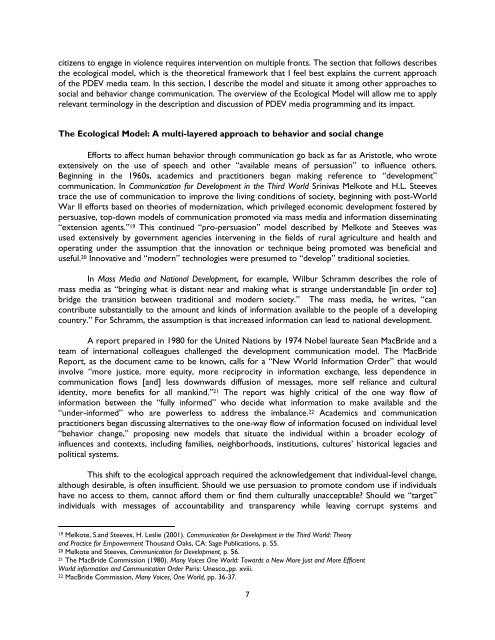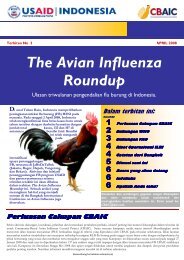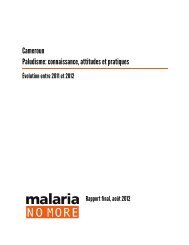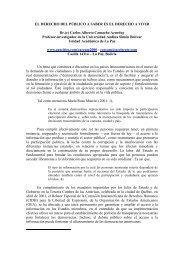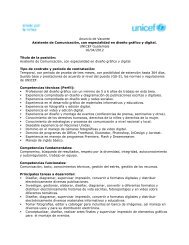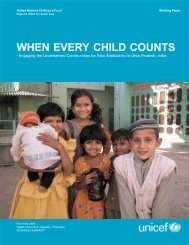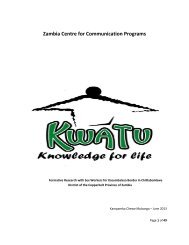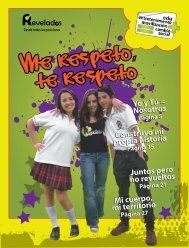to download the 38-page evaluation - The Communication Initiative ...
to download the 38-page evaluation - The Communication Initiative ...
to download the 38-page evaluation - The Communication Initiative ...
You also want an ePaper? Increase the reach of your titles
YUMPU automatically turns print PDFs into web optimized ePapers that Google loves.
citizens <strong>to</strong> engage in violence requires intervention on multiple fronts. <strong>The</strong> section that follows describes<br />
<strong>the</strong> ecological model, which is <strong>the</strong> <strong>the</strong>oretical framework that I feel best explains <strong>the</strong> current approach<br />
of <strong>the</strong> PDEV media team. In this section, I describe <strong>the</strong> model and situate it among o<strong>the</strong>r approaches <strong>to</strong><br />
social and behavior change communication. <strong>The</strong> overview of <strong>the</strong> Ecological Model will allow me <strong>to</strong> apply<br />
relevant terminology in <strong>the</strong> description and discussion of PDEV media programming and its impact.<br />
<strong>The</strong> Ecological Model: A multi-layered approach <strong>to</strong> behavior and social change<br />
Efforts <strong>to</strong> affect human behavior through communication go back as far as Aris<strong>to</strong>tle, who wrote<br />
extensively on <strong>the</strong> use of speech and o<strong>the</strong>r ―available means of persuasion‖ <strong>to</strong> influence o<strong>the</strong>rs.<br />
Beginning in <strong>the</strong> 1960s, academics and practitioners began making reference <strong>to</strong> ―development‖<br />
communication. In <strong>Communication</strong> for Development in <strong>the</strong> Third World Srinivas Melkote and H.L. Steeves<br />
trace <strong>the</strong> use of communication <strong>to</strong> improve <strong>the</strong> living conditions of society, beginning with post-World<br />
War II efforts based on <strong>the</strong>ories of modernization, which privileged economic development fostered by<br />
persuasive, <strong>to</strong>p-down models of communication promoted via mass media and information disseminating<br />
―extension agents.‖ 19 This continued ―pro-persuasion‖ model described by Melkote and Steeves was<br />
used extensively by government agencies intervening in <strong>the</strong> fields of rural agriculture and health and<br />
operating under <strong>the</strong> assumption that <strong>the</strong> innovation or technique being promoted was beneficial and<br />
useful. 20 Innovative and ―modern‖ technologies were presumed <strong>to</strong> ―develop‖ traditional societies.<br />
In Mass Media and National Development, for example, Wilbur Schramm describes <strong>the</strong> role of<br />
mass media as ―bringing what is distant near and making what is strange understandable [in order <strong>to</strong>]<br />
bridge <strong>the</strong> transition between traditional and modern society.‖ <strong>The</strong> mass media, he writes, ―can<br />
contribute substantially <strong>to</strong> <strong>the</strong> amount and kinds of information available <strong>to</strong> <strong>the</strong> people of a developing<br />
country.‖ For Schramm, <strong>the</strong> assumption is that increased information can lead <strong>to</strong> national development.<br />
A report prepared in 1980 for <strong>the</strong> United Nations by 1974 Nobel laureate Sean MacBride and a<br />
team of international colleagues challenged <strong>the</strong> development communication model. <strong>The</strong> MacBride<br />
Report, as <strong>the</strong> document came <strong>to</strong> be known, calls for a ―New World Information Order‖ that would<br />
involve ―more justice, more equity, more reciprocity in information exchange, less dependence in<br />
communication flows [and] less downwards diffusion of messages, more self reliance and cultural<br />
identity, more benefits for all mankind.‖ 21 <strong>The</strong> report was highly critical of <strong>the</strong> one way flow of<br />
information between <strong>the</strong> ―fully informed‖ who decide what information <strong>to</strong> make available and <strong>the</strong><br />
―under-informed‖ who are powerless <strong>to</strong> address <strong>the</strong> imbalance. 22 Academics and communication<br />
practitioners began discussing alternatives <strong>to</strong> <strong>the</strong> one-way flow of information focused on individual level<br />
―behavior change,‖ proposing new models that situate <strong>the</strong> individual within a broader ecology of<br />
influences and contexts, including families, neighborhoods, institutions, cultures‘ his<strong>to</strong>rical legacies and<br />
political systems.<br />
This shift <strong>to</strong> <strong>the</strong> ecological approach required <strong>the</strong> acknowledgement that individual-level change,<br />
although desirable, is often insufficient. Should we use persuasion <strong>to</strong> promote condom use if individuals<br />
have no access <strong>to</strong> <strong>the</strong>m, cannot afford <strong>the</strong>m or find <strong>the</strong>m culturally unacceptable? Should we ―target‖<br />
individuals with messages of accountability and transparency while leaving corrupt systems and<br />
19 Melkote, S.and Steeves, H. Leslie (2001). <strong>Communication</strong> for Development in <strong>the</strong> Third World: <strong>The</strong>ory<br />
and Practice for Empowerment Thousand Oaks, CA: Sage Publications, p. 55.<br />
20 Melkote and Steeves, <strong>Communication</strong> for Development, p. 56.<br />
21 <strong>The</strong> MacBride Commission (1980). Many Voices One World: Towards a New More Just and More Efficient<br />
World information and <strong>Communication</strong> Order Paris: Unesco,,pp. xviii.<br />
22 MacBride Commission, Many Voices, One World, pp. 36-37.<br />
7


